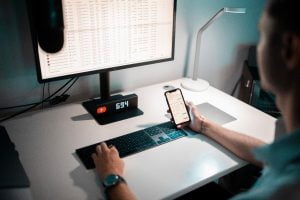Trading floors are treated as Mobile restricted areas
A Business Insider review of an internal memo indicates that Barclays limits employees using personal devices on the firm’s trading floor.
It is easy to share or steal sensitive information in 2021. A simple mobile device and a range of messaging apps, such as WhatsApp, Signal, and Telegram, allow you to deliver all kind of information in seconds. With the ability to later delete such traces. This is clearly in addition to the use of mobile voice and video calls.
The problem is that traders are not fully aware of the potential risks to their firms, when they are sharing information while using their personal mobile devices.
In the past several years, one of the most significant changes in corporate work, has been the adoption of mobile devices in the workplace and their impact on employee performance. Identifying and preventing fraudulent activities in the market has always been a challenge for regulators and compliance managers. Regulatory policies have always contributed to maintaining transparency in the market.
Throughout history, humanity has adapted to changes to survive the most difficult situations. And we have yet again proved it amidst the Covid-19 pandemic. Due to the pandemic’s restrictions, people have begun working from home rather than in offices or trading floors. But this has brought compliance to a whole new level.
A new regulatory landscape- To BYOD or not to BYOD
Unless effectively and continuously monitored, personal devices can become a gateway for market abuse. The difference between a work mobile device and a personal mobile device is that corporate mobile devices are more commonly recorded, restricted, and monitored, while BYOD employee devices might have open access, unmonitored, and open to abuse.
Due to changes in technology and communication patterns and an increasing trend of remote work, the Covid-19 pandemic has altered the way businesses conduct their operations.FCA expects firms to comply with record-keeping requirements and monitor for market abuse, as some of these changes are long-term. To meet these requirements, firms must have controls and oversight that detect and prevent market abuse.
All mobile communications including text messages must be archived and monitored for ensuring compliance.
As BYOD becomes more widespread, more employees use text and chat apps and other consumer platforms at their workplace. Using BYOD has a significant impact on employee productivity; however, it can also lead to security risks and data breaches. When mobile devices are not archived, businesses run the risk of not complying with compliance obligations. They are unable to provide content in response to eDiscovery orders.
Regulations require firms to record conversations and communications made with, sent from, and received on equipment permitted for business purposes. In order to comply with the recording rules, companies must make sure that their telephone conversations and electronic communications are recorded.
A secure enterprise messaging app is essential when implementing BYOD in your organization, especially if you are in an industry that deals with sensitive and private data, such as healthcare, finance, or public safety.
Smartphones are mini-computers in our pockets.
Research indicates that 95% of employees send work-related information over their smartphones, of which 75% are high-sensitive. Only 13% of companies limit the use of texting for work-related tasks.
Companies and employees are often unaware of the compliance and privacy issues associated with BYOD policies. The former managing director at Brevet Capital Management LLC, Paul Iacovacci, sued his former employer in 2018. He claimed that his former employer allegedly gained access to his home computer to read his emails and steal personal data.
Mobile devices have been among the most significant changes in corporate work over the past few years, and their impact on employee performance has been striking. A 35-year-old man was arrested for allegedly hacking the system of his former employers and collecting all their data to get back at them for sacking him during the lockdown, hoping to get his job back. Kunal Aggarwal, CEO of the company, claimed that some information had been hacked and deleted, including information on some COVID-19 hospitals and non-COVID hospitals.
Deliberately deleting messages or failing to retain information may indicate that non-compliant activities are hidden. Konstantin Vishnyak, a former VTB Banker, was charged with non-compliance after deleting his WhatsApp messages. According to the FCA, Vishnyak deleted his WhatsApp after providing it as part of an investigation. Vishnyak was aware of the investigation-related information in the messaging app.
To prevent an incident similar to Vishnyak’s, companies that allow their employees to use their own devices must follow the FCA handbook rule SYSC 10A.1. Under this rule, an organization must take reasonable steps to prevent employees and contractors from making, sending, or receiving relevant telephone calls and electronic communications on privately-owned devices that the organization cannot monitor or record.
How to handle mobile phones for employees working from home?
It is vital to educate employees about good work culture.
Monitoring an employee’s business activities without invading their privacy is indeed a challenge. As more and more people work remotely, such a practice is no longer possible. Good work culture is therefore essential. Companies must educate their employees on the importance of ensuring compliance. Companies must be able to communicate the standards that an employee must meet, regardless of their location.
In order to work from home, it is critical to meet regulatory requirements and implement a secure enterprise solution. Thus, for secure enterprise instant messaging, a tool that ensures regulatory compliance is necessary. A good work culture prevents compliance violations. Compliance officials must be informed of any malpractice, whether spotted or heard when working from the office.
How can technology help?
A tool that ensures regulatory compliance is necessary.
For secure enterprise instant messaging, a tool that ensures regulatory compliance is necessary. Capturing and archiving all electronic communications is of the utmost importance to prevent insider threats created by employees. Monitoring employee communications can provide insight into suspicious activities. Maintaining records of text messages and phone calls, as well as archiving all electronic communications, helps in ensuring compliance.
It is especially challenging to prevent market abuse and non-compliance with regulations when traders operate from home. As a result of this increased risk of market abuse, companies need to mitigate it rapidly. Enhancing monitoring and conducting retrospective reviews could achieve this. In light of the regulations, all employees must be fully aware of their responsibilities.
About TeleMessage
TeleMessage captures and retains mobile content, including mobile SMS messages, voice calls, and WhatsApp, and WeChat conversations from corporate or BYOD mobile phones to ensure compliance with various data protection regulations. The messages are securely and reliably retained within TeleMessage servers or forwarded to your choice of archiving data storage vendor.
Our mobile archiving products securely record content from mobile carriers and mobile devices for various ownership models (BYOD, CYOD, and employer-issued). With our multiple archiving solutions, you can always find the right tools or blend for your requirements:
- Network Archiver
- Enterprise Number Archiver
- Android Archiver
- WhatsApp Archiver
- WeChat Archiver
- Signal Archiver
- Telegram Archiver
TeleMessage offers cross-carrier and international mobile text & calls archiving for corporate and BYOD phones. Visit our website at www.telemessage.com to learn more about our mobile archiving products.





